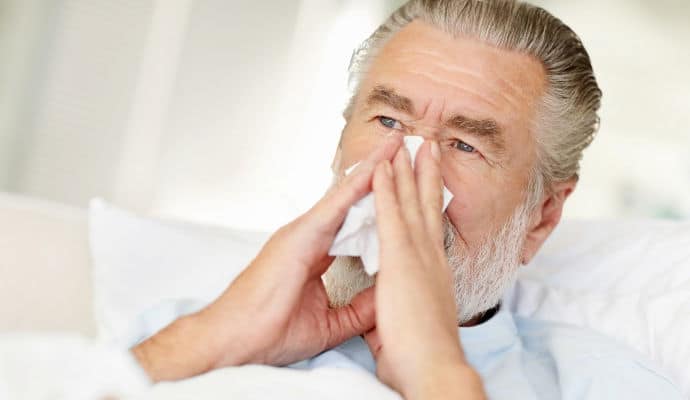
Date published: 2024-10-15
Seniors and caregivers are vulnerable to the flu
Cold and flu season is upon us again. In addition, Covid-19 will still be circulating in our communities.
It's wise to take precautions because seniors and caregivers are usually two of the most likely groups of people to get sick.
Older adults have weaker immune systems and so do most caregivers (due to lack of sleep and chronic stress).
And if you spend a lot of time together, you’re more likely to pass germs back and forth.
Even so, there’s still a lot that you can do to reduce the chances that you or your older adult will get sick and to reduce the length or severity of a cold or flu.
Basically, the goal is to boost the immune system and reduce exposure to germs.
We share 10 tips for avoiding the flu and in case you or your older adult gets sick, we’ve got 6 tips that prevent serious flu complications and ease symptoms.
Note: The tips below focus on cold and flu prevention tips. To reduce the risk of contracting Covid-19, follow CDC guidelines – wear a face mask and wash your hands.
10 cold and flu prevention tips reduce risk for seniors and caregivers
1. Get the flu vaccine
Getting a flu shot reduces the risk of getting the flu. It also reduces the severity of the illness and protects against complications – both especially important for seniors..
And when you get a flu shot, you reduce the risk that you’ll get sick and infect your older adult.
The best time to get a flu shot is from October through November, but experts say that it's still useful to get the shot even if it’s later in the flu season.
2. Wash or sanitize hands thoroughly and often
Frequently hand washing with regular soap is an effective way to get rid of cold and flu germs.
Using regular soap is fine because rubbing the hands together for at least 20 seconds is what eliminates germs – long enough to sing the Happy Birthday song twice. Make sure to clean under the nails, backs of hands, between fingers, and wrists.
If you can’t get to soap and water often enough, use hand sanitizer with at least 60% alcohol to kill cold and flu germs.
This may be a good option for older adults who can’t easily get up to wash their hands.
3. Exercise regularly
Exercise helps boost the immune system. Some studies show that moderate intensity exercise may cut down the number of colds you get.
Even though caregiving doesn’t leave a lot of time for exercise and older adults may not have a lot of endurance, any amount of regular exercise will benefit the body and immune system.
4. Avoid touching the eyes, nose, and mouth
We often touch our faces without thinking, which is a common way for cold and flu germs to enter the body.
To reduce the risk of getting sick, minimize touching of the face.
5. Clean the environment to eliminate germs
Try to keep the environment as germ-free as possible. That means using disinfectant when cleaning, especially in the bathroom and kitchen.
When cleaning, pay special attention to germ hot spots like doorknobs, light switches, and kitchen and bathroom counters.
And, make sure to disinfect cleaning sponges and rags (a breeding ground for germs) by changing them frequently, soaking in bleach, microwaving for 1-2 minutes, or running through the dishwasher.
In an outside workplace, wash your hands after touching communal office spaces and regularly disinfect your own work area.
6. Sanitize your mobile devices
Something that many people forget is how dirty and germ-filled their mobile device is.
Clean it regularly with sanitizing wipes or rubbing alcohol – being careful not to wet the electronics.
7. Stay away from people who are sick
It might sound obvious, but it’s worth repeating: keep your distance from people who are sick.
If you need to be around a sick person, limit your contact and avoid unnecessary touching like shaking hands or hugging.
8. Avoid crowds and unnecessary travel
Try to avoid being in large groups of people, especially in poorly-ventilated spaces. That increases the chance of catching a cold or flu from an infected person.
9. Drink plenty of liquids
Staying hydrated with plenty of liquids, especially plain water or hot tea, can help the body better fight off germs.
10. Get added Vitamin C and protein through nutritious foods
The nutrients you get from healthy foods, like fruits, vegetables, herbs, and spices are essential to keeping your immune system functioning properly.
These nutrients, including beta carotene, zinc, probiotics, protein, and vitamins C and D, help your immune system do its job,
It’s also worth noting that research suggests that both Vitamin C deficiency and low protein intake can both increase the chances of getting sick.
Boost the immune system with fruits and vegetables high in Vitamin C and healthy proteins like nuts, legumes, poultry, and seafood.
6 tips to prevent flu complications and ease symptoms
Despite the best efforts, people can still get sick with the flu.
Here are some tips to protect seniors from deadly complications and make symptoms more bearable.
1. Visit the doctor ASAP for prescription antiviral medication
Getting antiviral drugs as soon as possible can make the flu milder and prevent serious flu complications.
This is especially important for older adults. It could mean the difference between just having the flu or being hospitalized with severe pneumonia.
Flu antiviral drugs typically work best if they’re started within 2 days of getting sick, but starting them later can still be helpful – especially for seniors because they’re at such high risk of complications.
Don’t hesitate to call the doctor if you or your older adult get sick, even if you’re not 100% sure it’s the flu – they can help with the diagnosis.
2. Avoid spreading the flu
A person with flu may be contagious up to 5 or more days after symptoms appear.
Protect others while sick by washing hands frequently, coughing or sneezing into a tissue and immediately throwing it away, and keeping a distance.
3. Use a humidifier
Moist air helps soothe sore throats and hacking coughs.
4. Drink chicken soup
This home remedy really does work. Steam opens nasal passages, the broth soothes the throat, and the soup actually helps infection-fighting white blood cells do a better job.
5. Drink extra liquids
Extra fluids help thin out the mucous and makes it easier to get it out of your system.
6. Rest or sleep at a 45 degree angle
Lying down causes mucous to gather in sinus cavities, which is unpleasant and could also lead to further infection.
Resting or sleeping at an angle helps prevent this and also reduces inflammation.
Recommended for you:
- Flu Shot for Seniors: 5 Reasons Why It’s So Important
- Prevent Serious Illness with 4 Vaccines for Seniors
- 4 Tips for Managing Multiple Chronic Health Conditions
By DailyCaring Editorial Team
Image: Lake Norman Pulmonary & Sleep
[optin-monster slug=”yxbytm35zhsdfopnw7qk”][optin-monster slug=”jvhyplxmb4umsjazxecn”]
About the Author

Connie Chow
Connie was a hands-on caregiver for her grandmother for 20 years. (Grandma made it to 101 years old!) She knows how challenging, overwhelming, and all-consuming caring for an older adult can be. She also knows how important support is — especially in the form of practical solutions, valuable resources, and self-care tips.





thank you
You’re welcome! We’re glad this article is helpful.
The flu is caused by influenza viruses, but many distinct viruses can cause a cold. Seasonal flu activity typically occurs between October and May, although flu viruses are around all year. Since colds and flu are caused by viruses, rather than bacteria, antibiotics are not an effective treatment option. There is no cure for a cold, though over-the-counter medications may ease symptoms. Types of flu: Influenza A, Influenza B, Influenza C & Influenza D. You can also refer to this article which states all the necessary details about flu https://www.everydayhealth.com/flu/guide/
Thanks for sharing. We have more facts and info about the flu and how vaccinations help protect older adults from serious complications here — 5 Reasons Why a Flu Shot for Seniors Is Essential https://dailycaring.com/5-reasons-you-should-get-a-flu-shot-today/